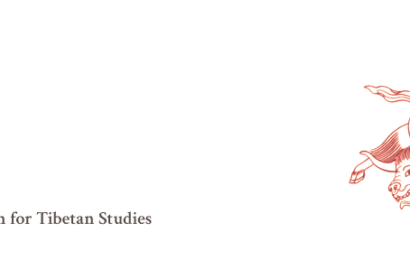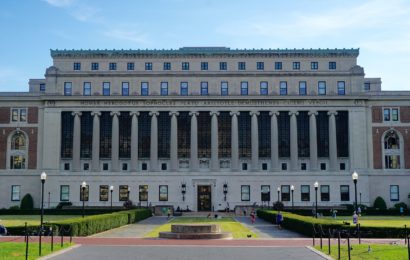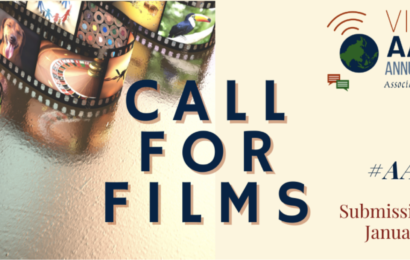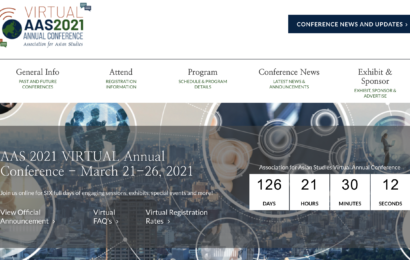The Association for Asian Studies (AAS)
The Association for Asian Studies is a scholarly, non-political, non-profit professional association open to all persons interested in Asia and the study of Asia. With approximately 7,000 members worldwide, representing all the regions and countries of Asia and all academic disciplines, the AAS is the largest organization of its kind.
Through its publications, online resources, regional conferences, and annual conference, the AAS provides its members with a unique and invaluable professional network.
The AAS was founded in 1941, originally as publisher of the Far Eastern Quarterly (now the Journal of Asian Studies). It has gone through a series of reorganizations to serve better the broadening disciplinary and geographical interests of its membership.
In 1970 four elective Area Councils—China and Inner Asia (CIAC), Northeast Asia (NEAC), South Asia (SAC), and Southeast Asia (SEAC)—were established to guarantee each area constituency its own representation and a proportionate voice on the Board of Directors.
In 1977 a Council of Conferences (COC) was established as a liaison with several regional conferences which serve the needs of Asian studies scholars in different parts of the U.S. and abroad.
The AAS is a member of the American Council of Learned Societies, actively participating with its sister societies in a wide range of activities, including joint participation in research and informational exchanges.
Read details at: http://www.asian-studies.org
AAS Annual Conference
March 21-24 Denver. US
Dear Colleagues:
On behalf of the Program Committee for the Association for Asian Studies, I am pleased to issue the Call for Proposals for the AAS Annual Conference to be held March 21-24, 2019 at the Sheraton Denver Downtown Hotel in Denver, Colorado.
We are pleased to invite colleagues in Asian studies to submit proposals for Organized Panels, Roundtables, and Workshop sessions, in addition to Individual Papers proposals for the committees consideration. The program committee seeks sessions that will engage panelists and audiences in the consideration of ideas, information, and interpretations that will advance knowledge about Asian regions and, by extension, will enrich teaching about Asia at all levels. AAS Membership is not a requirement for the submission of a proposal or participation.
We have updated our Call for Proposals related webpages to try and make this process as simple and clear as possible. Please see the three-step guide below to start your submission process. The deadline for submission of all proposals and Late Developing Countries (LDC) travel grant requests is Wednesday, August 1 at 5pm Eastern Time. All proposals must be submitted electronically via the AAS electronic submission application. We will not accept proposals submitted via email. This proposal submission application will be available for submissions beginning Tuesday, May 29 through Wednesday, August 1, 2018. After the submission deadline, your proposal will be forwarded to the appropriate program committee members for review. You will find detailed instructions via the sections listed in the right hand column on this screen.
If you have any questions regarding panel participation or proposal submissions that are not answered in this Call for Proposals or the FAQ’s, please contact the AAS secretariat at AASconference@asian-studies.org.
We look forward to an exciting and intellectually stimulating conference in the mile high city of Denver that reflects the dynamism of Asian studies and the AAS.
Sincerely,
Anne Hansen, University of Wisconsin, Madison
AAS 2019 Program Committee Chair
1) DECIDE ON YOUR PROPOSAL TYPE
a) Review this Call for Proposals and the information regarding the four (4) proposal submission types – Organized Panel session, Roundtables, Workshops or Individual Paper submission.
- b) Review the requirements of each proposal type, including the minimum/maximum number of participants, abstract word counts, etc.
- c) Review the AAS diversity and inclusion submission guidelines to ensure your preparations and final submitted proposal meet the AAS conference requirements.
2) PREPARE SUBMISSION MATERIALS
- a) Develop individual paper/presentation abstracts based on the submission requirements. If submitting an organized panel proposal, the organizer is responsible for collecting and submitting ALL data and information from session proposal participants including paper titles/abstracts, names and contact information for each participant on the session.
- b) If applying for an LDC Travel Grant on behalf of a participant, review the information to ensure the participant qualifies for an LDC grant.
- c) Have questions? Find answers at our CFP Frequently Asked Questions section.
3) SUBMIT YOUR MATERIALS BY WEDNESDAY, AUGUST 1, 2018 AT 5:00PM EST
- a) Do not wait until August 1 to begin the submission process. You may begin the process and save a partially completed application. Edits can be made anytime before August 1 @ 5
- b) Follow the “Submit a Proposal’ button posted here on this page in the right column.
- c) Questions? Confused? Contact the AAS Secretariat
- d) Sit back and relax while the program committee carefully reviews, evaluates the submission received.
The Program Committee will complete all final selection during their fall meeting in August. All organizers/submitters will receive a decision via email the week of August 27-31, 2018. Please keep in mind the AAS receives approximately 1,000 submissions and can only accommodate a portion of the submissions received.
General Rules
The AAS has established submission guidelines that apply to all participants and proposal submission types. We urge you to pay close attention to some long-established principles upon submitting your proposal:
ONE(1) SESSION APPEARANCE RULE
No Individual is to be on the formal program in more than one (1) session. This rule applies to ALL SESSION PARTICIPANTS including Chairs, Paper Presenters and Discussants and all session types -Organized Panels, Roundtables and Workshops. The One Appearance Rule also applies to Individual Paper Abstract Proposal submitters. If an individual has accepted an invitation to participate as a chair, paper presenter or discussant on one session, he/she should not also accept additional invitations to appear on additional proposals/sessions or also then submit a separate Individual Paper proposal. Organizers must confirm that the proposed panelists are listed on their proposal only and have not agreed to participate on another session. The name of a single individual on more than one proposal could threaten the chance of acceptance of every proposal involved. Note: Individuals may ORGANIZE more than one session.
PROPOSALS SHOULD BE IN FINAL FORMATION BEFORE SUBMISSION
A proposal should be a commitment in the sense that its original configuration (the original proposal submission) should match its final appearance in the printed program, and its presentation at the conference. Replacement participants are allowed but additional participants and co-authors are not allowed after the proposal has been accepted.
PRESENTERS COMMITMENT TO PARTICIPATE
Habits of collegiality and professional courtesy are both the pattern and the continued expectation at the AAS conference. Most fundamental are the honoring of commitments to present papers and the provision of papers to discussants in a timely fashion. The Program Committee assumes and celebrates an interactive style and effective communication in the evolution and delivery of a well-coordinated session. Individual paper sessions also benefit from the best observation of professional practices.
NO-SHOWS
The program committee has noted a growing number of “no-shows” among session participants. It is disrespectful toward fellow panelists and audiences, and unfair to those applicants who were not selected for inclusion on the program. Therefore, sessions will be closely monitored at the conference to note all no-shows. Participants who fail to notify the AAS secretariat in advance that they will not be able to attend the conference and participate in their session will not be allowed to submit a proposal for the following year’s conference.
►Proposal Selection Criteria
The Program Committee considers the annual conference program to be primarily a collection of Organized Sessions (i.e. paper sessions, roundtables or workshops). For this reason, we accept a far higher percentage of session proposals (approximately 68%) than individual paper submissions (approximately 10%). The Committee will look favorably on imaginative sessions that address issues of interest to a wide constituency, incorporate comparative perspectives, or cross disciplinary boundaries.
The Program Committee focuses on the following criteria when reviewing and scoring proposals:
- Intellectual quality of the research (originality of material or interpretations, soundness of methodology, knowledge of the field, etc.).
- Quality of the written abstracts, the overall panel abstract being of greatest importance (clear, jargon-free prose is especially valued).
- Coherence of the papers to the overall panel topic and quality of paper abstracts.
- Diversity in Gender, ethnicity, and institutional balance with a combination of junior and senior scholars.
- Indication of a commitment to stimulating active discussion at panel sessions.
- Attention to AAS guidelines (deadline, prohibition on more than one appearance, limits on number of presenters, etc.).
The committee will attempt to include sessions on a wide variety of subjects and approaches, including scholarly, pedagogical, and professional subjects; consciously support the inclusion of panels focused on topics of concern in all geographic areas of Asia; encourage the presentation of new scholarship in social science disciplines under-represented at AAS conferences; strive to balance its selections between topics of continuing interest and new topics to which little or no attention has been paid; and try to span different time periods and subject matters in sessions constructed from individual papers.
The committee makes every effort to assure diverse representation through the inclusion of minorities, women, graduate students, and international colleagues, and will seek to reflect the regional and disciplinary diversity of the association’s membership and Asian studies community.
►Innovative Session Formats
The Program Committee supports innovative formats that will encourage bold thinking, lively dialogue, and audience involvement. We urge session organizers to explore ways in which ideas can be communicated most effectively and ways in which the audience can contribute to the liveliness of the dialogue. We encourage a variety of presentation formats. The following list of potential formats for the panel illustrates a range of styles, but is not meant to confine your options:
- Formats that highlight through their structure a clash of perspectives, interpretations, or methodologies.
- Formats that involve a number of mini-presentations (5-10 minutes) around a single theme (organizers of such panels should choose the roundtable format; the application allows a maximum five presenters to be listed in the program though more participants could be included).
- Formats involving the discussion of primary sources.
- Formats in which commentators begin by summarizing and commenting on the papers and the paper-givers then respond.
- Panels in which participants present one another’s work rather than their own.
- Workshop-style sessions on works-in-progress.
- Formats that allow sharply focused commentary from the audience at an early point in the panel.
- Formats in which a single, major paper, film, or book is the subject of attention. The commentary and other papers would focus on the work in question.
- Roundtables that examine teaching in the field or that explore innovative approaches to teaching a particular subject.
- Formats involving a performance, presentation, or reading of a creative work followed by a discussion.
- Formats that involve pre-circulating papers available to all attendees.* In these panels members of the audience would be expected to have read the papers in advance and presenters would give only brief introductory remarks (for example, five minutes) before comments and discussion.
Session organizers suggesting innovative formats should check the appropriate box on the application form and make a case for the innovative character of the panel’s format in their proposals. If you are submitting an Innovative format that includes paper presentations, select the Organized Panel proposal type. If your Innovative format does not include papers, select either the Roundtable or Workshop proposal type. Select ‘Yes’ on the application to the question “Would you like this proposal to be considered an Innovative Panel proposal?” Be sure to indicate what makes your roundtable or workshop innovative in your proposal (that is, indicate why these panels go beyond the usual expectations of a roundtable or a workshop). Organized Panels proposing the use of pre-circulating papers should clearly indicate this format in the proposal (please use the words “pre-circulating papers” at some point).
Organizers of sessions with innovative formats need to keep in regular communication with participants about the special expectations of their panels (in terms of time limits, papers circulated among participants well in advance, presentation form, etc.).
Read details at: http://www.asian-studies.org/Conferences/AAS-Annual-Conference/Conference-Menu/Home-Cover
AAS-in-ASIA-2019
July 1-4, 2019 in Bangkok
The AAS-in-ASIA conferences are intended to be smaller size conferences than the typical AAS Annual Conferences. This conference gives our members and others interested in Asian Studies, who are unable to attend the Annual Conferences held in North America, the opportunity to participate on panel sessions and network with colleagues in a more intimate setting. Although smaller in size, these conferences include the same exciting features as the Annual Conference, including sessions, keynote speakers, book exhibits and receptions.
Each year, AAS-in-ASIA conferences are a joint production between the Association for Asian Studies and a local host university and committee.
The 2019 AAS-in-ASIA conference will be held July 1-4, 2019 in Bangkok, Thailand at the Royal Orchid Sheraton Hotel.
The conference is hosted by Thammasat University.
General Rules
The AAS has established submission guidelines that apply to all participants and proposal submission types. We urge you to pay close attention to some long-established principles upon submitting your proposal:
ONE(1) SESSION APPEARANCE RULE
No Individual is to be on the formal program in more than one (1) session. This rule applies to ALL SESSION PARTICIPANTS including Chairs, Paper Presenters and Discussants and all session types -Organized Panels, Roundtables and Workshops. The One Appearance Rule also applies to Individual Paper Abstract Proposal submitters. If an individual has accepted an invitation to participate as a chair, paper presenter or discussant on one session, he/she should not also accept additional invitations to appear on additional proposals/sessions or also then submit a separate Individual Paper proposal. Organizers must confirm that the proposed panelists are listed on their proposal only and have not agreed to participate on another session. The name of a single individual on more than one proposal could threaten the chance of acceptance of every proposal involved. Note: Individuals may ORGANIZE more than one session.
PROPOSALS SHOULD BE IN FINAL FORMATION BEFORE SUBMISSION
A proposal should be a commitment in the sense that its original configuration (the original proposal submission) should match its final appearance in the printed program, and its presentation at the conference. Replacement participants are allowed but additional participants and co-authors are not allowed after the proposal has been accepted.
PRESENTERS COMMITMENT TO PARTICIPATE
Habits of collegiality and professional courtesy are both the pattern and the continued expectation at the AAS conference. Most fundamental are the honoring of commitments to present papers and the provision of papers to discussants in a timely fashion. The Program Committee assumes and celebrates an interactive style and effective communication in the evolution and delivery of a well-coordinated session. Individual paper sessions also benefit from the best observation of professional practices.
NO-SHOWS
The program committee has noted a growing number of “no-shows” among session participants. It is disrespectful toward fellow panelists and audiences, and unfair to those applicants who were not selected for inclusion on the program. Therefore, sessions will be closely monitored at the conference to note all no-shows. Participants who fail to notify the AAS secretariat in advance that they will not be able to attend the conference and participate in their session will not be allowed to submit a proposal for the following year’s conference.
Read details at: http://www.asian-studies.org/Conferences/AAS-in-ASIA-Conferences/India-2018home







